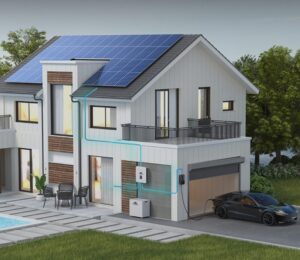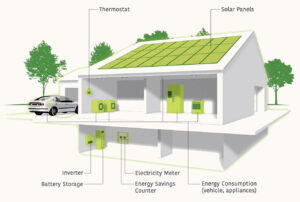What is a residential Household solar energy storage system and how does it work?
In pursuing environmentally sustainable living, residential solar storage systems are essential in every home. They have become vital players, revolutionizing how homes manage and consume energy. We at MK Energy share the core of this innovation with you in this guide, letting you know what a Household solar energy storage system is and revealing its inner workings.
What is a household solar energy storage system?
Household solar energy storage systems are a new solution to store excess energy generated by residential solar panels. Unlike traditional setups that rely solely on immediate consumption or grid feedback, this system introduces an autonomous element that allows homeowners to store surplus energy for later use. This paradigm shift transforms solar power from a real-time resource into a flexible, on-demand energy reserve. Household solar energy storage systems position homeowners as active participants in the energy ecosystem. By accumulating surplus energy, households reduce their dependence on the external grid and contribute to grid stability during peak demand periods.
How does it work?
Their work begins with solar panels converting sunlight into electricity; however, integrating high-capacity batteries makes home solar storage systems unique. These batteries act as energy reservoirs, absorbing and storing excess electricity generated during peak hours of sunlight. Once the sun goes down or the sky is cloudy, the stored energy is released, ensuring a continuous and reliable power supply to the home. As the panels convert sunlight into electricity, excess energy beyond immediate consumption needs is directed to the integrated battery. These batteries, which often utilize lithium-ion technology for increased efficiency, act as the backbone of a storage system, carefully accumulating and preserving energy for future use.
Intelligent energy management system
Modern home solar storage systems employ intelligent energy management systems (EMS) to optimize energy consumption and storage. These systems utilize advanced algorithms to analyze energy patterns, weather forecasts, and household consumption trends. EMS optimizes the battery’s charge and discharge cycles by interpreting this data, ensuring maximum efficiency and cost-effectiveness. The introduction of EMS represents an essential advancement in energy storage technology. Imagine a complex network of algorithms constantly evaluating data points: current energy demand, weather conditions affecting solar input, and historical consumption patterns. The EMS acts as a virtual orchestrator, fine-tuning the operation of the solar storage system for optimal performance and full energy utilization.
Determining the Correct Capacity of a household solar energy storage system
An essential aspect of adopting a home solar storage system is determining the appropriate capacity. Factors we need to consider include assessing the home’s energy needs, the solar installation size, and the energy independence level required. The size of a home solar storage system becomes critical. Precisely sized solar storage systems can meet a home’s energy needs, avoiding inefficiencies or underutilization. Carefully weigh daily energy consumption, peak usage times, and future expansion plans to determine ideal system capacity.
Resilience Factors for Residential Solar Storage
In addition to being able to address day-to-day energy needs, home solar storage systems also introduce a layer of resiliency, especially during power outages. In a grid failure or unforeseen circumstances, stored energy becomes a lifeline, keeping essential equipment running and providing security. This aspect of emergency preparedness is increasingly driving behind the adoption of residential solar storage solutions. In emergency preparedness, stored energy can serve as a safeguard to ensure critical equipment such as home appliances remain operational. This resiliency factor increases security and helps enhance a sense of self-sufficiency during challenging times.
Finally, summarize
For those new to using solar energy storage systems, this guide will help them understand how they work. Of course, this is some fundamental information. If you want more detailed information, you can visit our official website to view the relevant content.



